July - August 2016
Dear Friends,
It’s been an exciting summer of transition as the 2015-16 Fellows conclude their year of service, while the 2016-17 Fellows are just setting off. Some of the 2015-16 Fellows reflect on the last 12 months in this Fellows Flyers. The summer has also been filled with planning for our 2016 Annual Gala!
In addition to our new class of Fellows, PiAf is also excited to welcome two new members of our team- Swathy Bansal and Isabelle Tan:
Swathy Bansal is very excited to join Princeton in Africa as the Development and Administrative Associate. With an education in historic preservation from the School of the Art Institute in Chicago, she previously managed several initiatives, such as the 10 Most Endangered NJ Historic Sites as Programs Director at Preservation New Jersey, a non-profit advocacy group in Trenton, NJ. She also has been a long-time grant writer for Thomas Edison Center (the site of Edison’s first laboratory) at Menlo Park, NJ and until recently with the McCarter Theater Center in Princeton. She lives in Princeton Junction with her family and enjoys bicycling, traveling, reading classics with her children and is an avid Sudoku enthusiast.
Isabelle Tan is a recent graduate from The College of New Jersey where she double majored in Self-Design Public Health and Women’s and Gender Studies. Her passion for health equity and social justice developed after she studied abroad in South Africa during the Summer of 2014. She is thrilled that her past work experience has led her to be the new Program Information & Communications Associate at Princeton in Africa, where she can gain professional experience while continuing her activism.
The Supporter Profile for this edition of the Fellows Flyer features Frank Strasburger, Co-Founder of PiAf. Frank has always demonstrated support and involvement towards PiAf. The PiAf community is grateful for his continuous work and effort, which has helped PiAf grow into the fellowship program it is today.
We hope you enjoy this edition of the Fellows Flyer!
Warm regards,
Jodianna Ringel
PiAf Connections
Please click below to check out pictures of our Fellows, Alums and other members of the PiAf family meeting up at home and around Africa.
Notes from the Field
By Victoria Bonds, 2015-2016 Fellow with Soko in Kenya
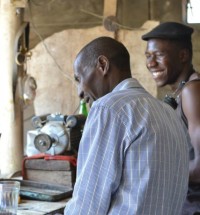
A group of Soko artisans in Rongai
My Journey Becoming An Artist
“When you buy something from an artist, you’re buying more than an object. You’re buying hundreds of hours of error and experimentation. You’re buying years of frustration and moments of pure joy. You’re not just buying one thing, you are buying a piece of a heart, a piece of a soul. A small slice of someone else’s life.”- UnknownWhen I began my fellowship in Kenya with Soko as a PiAf fellow, I couldn’t have imagined the impact that this experience would have on my life. Soko is a company that truly embodies the next generation of fashion. We (the consumers) increasingly want answers to a few questions before we say yes to supporting a brand: (1) Can I support this brand as a socially conscious consumer? (2) How are these goods being produced? (3) How can I make the most impact for my buck?
Ultimately, can I be fashionable and still make an impact, without compromising on quality?
The answer is ‘yes’; and it became clearer for me with every artisan workshop I visited, every design cycle that I supported with process building, every late night my co-workers spent to get out a major order and every customer support email that said, “thank you!” The resounding, “yes,” continued to grow as I participated in conversations that focused on agility, innovation and ethical production. This company, my new family, lived and breathed this concept of access. We can help to improve the lives of artisans (our partners) by providing access to the international market and making true and meaningful impact.
During my time with Soko, I have enjoyed hearing about this impact through storytelling. I can no longer look at pieces from the dash series without thinking about the stories I collected and time I spent in the workshop of Anton & Benta. Like true entrepreneurs, they made their business a family affair in a community not far from Nairobi. Nor can I look at the Duara Studs without being reminded of my colleague and friend Michael who designed them (check out his story here)!
It is striking how much I am reminded of my experience when I look at the quote above. As we are drawing near to the end of this amazing journey I recognize that I have become an artist! Maybe not what you typically think of when you hear the noun. But, a lover of beautiful handmade goods (that are certainly a small slice of someone else’s life), an individual who brings all of myself to design solutions and an admirer of the innovative ways in which we can make impact around the world.
If I were to take a wild guess, you too are an artist in your own right!
Notes from the Field
By Sol Eskenazi, 2015-2016 Fellow with African School of Economics in Benin
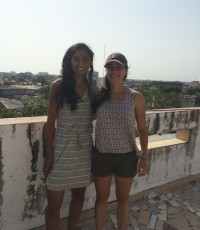
Sol (right) with Zara (left) in Cotonou, Benin.
Not a day passes by that I don’t think about my fellowship. Whether I am looking to solve a problem at work or I am encouraging one of my interns to apply to PiAf, I hark back to the lessons I gained from living and working in a small, but mighty country of West Africa. While my day-to-day tasks and interactions with co-workers at the African School of Economics gave me tremendous insights about development, it is my co-Fellow Zara Riaz who taught me, directly and indirectly, the most rewarding and important lessons of my fellowship experience.
When I first found out that another Fellow was going to be placed in the same organization, millions of questions raced through my mind: Who is this person? Will she like me? Will I like her? Will she be doing the same things that I will be doing? Will she understand and respect my alone time? And, more importantly, will she understand my passion for Brussels sprouts?! Needless to say, I was both excited and intimidated at the prospect of sharing my fellowship year with another person.
Contrary to what I envisioned, serving as a PiAf Fellow with Zara was the most challenging, but rewarding aspect of my fellowship. To start with, by spending 15 hours of my day with the same person, I can confidently say that the laws of coexistence have been ingrained in my mind. Besides learning how to peacefully live with another person, sharing my fellowship with Zara made me more humble. While at the beginning we struggled to divide our work responsibilities, as we both wanted to do the juicy tasks, we soon realized that what really matters is whether things get done well and efficiently. In other words, I learned (and I think that Zara did, too) that it’s not about us, but about the organization. Last but not least, Zara has taught me what caring truly means. Whether acting as my nurse when I had malaria, painstakingly editing more than fifty cover letters and graduate applications from the students at the school, or pushing me and the students to deeply reflect about development, Zara has been–and continues to be–an inspiring force in my life.
Although a number of the initial questions I had remain unanswered, one thing is clear: Zara made my PiAf experience exponentially better. While not without ups and downs, working in the same office and living a few feet apart from each other for my fellowship year not only broadened my understanding about development, but also gave me invaluable wisdom that I hope to carry with me throughout my life.
Notes from the Field
By Charnelle Etti, 2015-2016 Fellow with Lutheran World Federation in Uganda
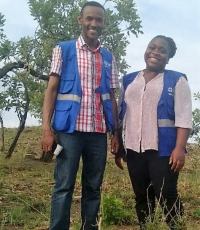
Charnelle (right) and Geremew (left) – the LWF team leader in Adjumani, pose for a photo during a field visit to Nyumanzi Refugee Settlement.
Uganda is a small landlocked country in East Africa. Kenya lies directly to the East, South Sudan to the North, the Democratic Republic of Congo to the West and Tanzania to the South. Uganda has been nicknamed “The Pearl of Africa” because of its vast and beautiful physical landscape and the friendly nature of Ugandans. The latter is the focus of my reflection and the reason I leave Adjumani in September with a smile, a heavy heart, and lessons to last a lifetime.
When I was offered the position to work with Lutheran World Federation (LWF), I was captivated by the opportunity of providing humanitarian and development assistance to South Sudanese refugees in Adjumani Refugee Settlement. Located approximately 450km from Kampala, Uganda’s capital city, Adjumani Refugee Settlement is situated in a small district still recovering from the traumatic effects of a two decade war between the Lord’s Resistance Army (LRA) and the Ugandan Government. From the onset, I knew Adjumani was remote and I would have little or no access to the daily amenities I was used to. However, I was humbled by the prospect of living a minimal lifestyle and learning about how the residents of Adjumani – Ugandans and refugees alike, conducted their everyday lives. Living in the LWF compound with about twenty staff members from different walks of life has been a major highlight during my time in Adjumani. Over the months, my new “family” and I have bonded and discussed all kinds of issues from gender roles to contemporary Nigerian movies.
However, more than anything else, food has emerged as an interesting platform for friendship, kindness and bonding. This first manifested when my colleagues offered me “white ants,” termite looking insects, caught during the raining season and prepared to look like meatballs. During another occasion, I was prepared a stew made of bush rats, a delicacy for Uganda’s Acholi tribe. What my colleagues will tell you is that I would start eating and half way through the meal, I would ask “Guys, can someone tell me what I am eating.” In response to this, my colleagues always laugh and appreciate my ability to be flexible in any situation. When I moved to Adjumani, I decided to think of myself as an empty book, with pages that needed to be filled to create my own Adjumani story. Through the sharing of food (sometimes not so pleasant), amongst other things, I realize how much my colleagues have filled the pages of my Adjumani story. This story comes to a close less than two months from now and I hope the preface will read something like, “This is a story of young woman, who took a challenge unlike any before. In the process, she learned about the challenges and intricacies of humanitarian and development aid. Like any new journey, she faced some setbacks. But on the days she felt like giving up, she had a new family that accepted, loved and supported her every step of the way – sometimes this support came in the form of a meal composed entirely of insects and that’s okay.”
Notes from the Field
By Nima Hassan, 2015-2016 Fellow with Population Services International in Kenya
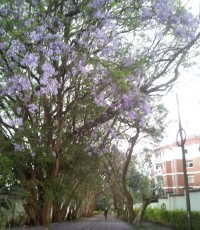
Jacaranda trees outside of Nima’s apartment. One of the many things she loved about living in Nairobi.
When people ask me how I like Nairobi my response is uncharacteristically unequivocal, completely free of qualifications, hems, or haws.
“I love it!”
When inevitably asked why, as a black woman grateful to be a wide and merciful ocean away from the increasingly discordant racial discourse in the U.S., I often cite the lack of psychic stress associated with racism and the relief in feeling inconspicuous, individual. The perverse joy to be had in this newfound freedom to be a bad tipper. But it is more than the absence of racism. It’s the heady fragrance of tuberose that fills my bedroom, the perfect late-July air temperature that accompanies me on my walk back from the office, the creamy 20 cent avocados, the entirely natural feeling social environment, and the way the city blends down-home human warmth with cosmopolitanism. It’s all and none of these things. Because my love for Nairobi, like love in general, is sui generis. I can’t pin it down to any one thing. A feeling of ease and creeping rightness snuck up on me my first few days in the city. I chalked it up to the usual new-destination honeymoon period. I went about my days waiting for the other shoe to drop, waiting for culture shock to set in, only to find a year later that it still feels disarmingly lovely and unexpectedly like home. I find myself wanting to stay. It reminds me of that old Sam Cooke lyric, “At first I thought it was infatuation—but oh, it’s lasted soooo long / Now I find myself wanting to marry you and take you home.” Indeed, Nairobi has put flesh to any number of cliché old saws about love for me. “When you know, ya just know!”Or, “It’s not that person won’t have flaws, it’s that the flaws somehow won’t seem so important. You’ll love the whole.” During my tenure in Kenya my bank almost collapsed, I got (mild) bacterial gastroenteritis, I was nearly pickpocketed on public transport, and was the victim of a home invasion perpetuated by monkeys (they were after the plantains, not the jewels). Sometimes when I’m walking down the street a refurbished bus will release a cloud of smoky black exhaust that engulfs me like The Doom. Anywhere else just one of those events might have sent me fumbling for my passport, furiously googling flights (read: escape routes), counting down the days until I could leave. Okay maybe not the monkeys, they were cute. But with Nairobi, they’ve become funny little anecdotes, exasperating but somehow simultaneously charming. Like the way one might be driven insane but also mildly amused by the way he always ALWAYS leaves the toilet seat up.
Nairobi and I are devoted but uncertain lovers. I want to commit, I clearly see a future but…”I have to establish my career first!” Employment, that perennial sine qua non to a putting a ring on it. For now I’ll content myself with really enjoying these last few months in the city and—to use one more cliché and really overextend this metaphor—savor the time we have left together.
Notes from the Field
By Anthony Orlando, 2015-2016 Fellow with Imani Development in Malawi
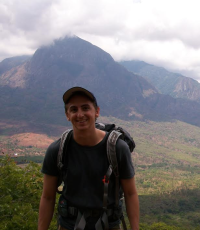
Anthony meandering up the majestic Mount Mulanje in Mulanje, Malawi
I’ve only spent 10 months in Africa so far, but I like to think I’m actually a good 13 to 14 months wiser for it. Here are some lessons I’ve learned (and relearned) since coming to Malawi:
Patience is a virtue
This axiom should be changed to “patience is a necessity.” That “2 o’clock” meeting will probably start around 3. The navigation of bureaucratic red tape sucks the joy out of life itself. The bus will be late, it will break down, and there will be traffic. Things will go wrong on small and large scales. It’s important to be flexible, avoid sweating the small stuff, and appreciate the universality of Murphy’s Law.
Relationships matter
This is true everywhere, but seems especially salient in Malawi. Professional and personal ties cross over daily. Being genuine in my interactions with others has opened a lot of doors that helped me at work. Networking is much more than collecting business cards and calling someone up when you need something from them- It’s about fostering a mutually beneficial relationship.
On the personal side of things, I’m lucky because almost every Malawian I’ve met has been exceedingly nice. It takes work, but if you invest the time to build relationships you will surely benefit by making new friends. I’ve bonded with locals over everything from having heated political debates to agreeing on how much Led Zeppelin totally shreds. It’s worth going out on a limb and striking up a conversation with the person next to you on the minibus.
Expectations ≠ reality
Yes, Force will still equal Mass times Acceleration due to gravity when you wake up tomorrow. Newtonian physics aside, not much else goes the way you predict it will.
It’s impossible not to have preconceptions about people, places, and situations. However, I learned it’s extremely important to hold onto those underlying assumptions very loosely. Some of them will change very little, and others you will be embarrassed to have ever had in the first place.
You don’t know nothin’
My man Socrates would agree with this one. A lot of things look simple from the outside, but they grow way, way more complex once you start learning more about them.
Show a little class
Imagine if some guy busted into your house during dinnertime, rummaged through your parents’ liquor cabinet, insulted your mother’s cooking, and aggressively hit on you or your sister. No one in their right mind dislikes my beautiful mother’s chicken cacciatore, but this is just an analogy for living abroad.
“Stuff” happens
And sometimes there is nothing you can do about it.
Look before you leap… but then leap
Rule #1: Just do it™
Rule #2: Safety firstLife is full of risks big and small, personal and professional, avoidable and inevitable. Go for it- best case scenario you’ll be better off. Worst case, you’ll probably be just fine.
Expect the unexpected, seize the moment, and tirelessly fight for what is yours
I’m talking about navigating Blantyre’s rush hour traffic, of course.
Notes from the Field
By Kelly Peuquet, 2015-2016 Fellow with Lwala Community Alliance in Kenya
The geographical determinants of health
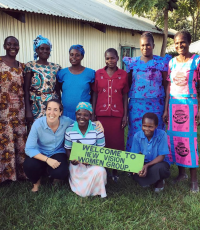
A group photo of Kelly (bottom left) with Lwala Community Alliance’s wonderful New Visions women’s tailoring group.
The phrase “social determinants of health” has become a buzzphrase in the field of global public health over the past 15 years. Upon its introduction, the phrase was a provocative acknowledgement of the ways in which the “non-health” social features of people’s lives dramatically influence their health outcomes. However, upon reading the reflections my coworker and Lwala Community Alliance’s Managing Director Julius Mbeya shared in a Father’s Day blog post, I have come to feel the phrase “social determinants of health” falls short of conveying the insidious localization of poor health.
In his post, Julius reflects on being a father to three young daughters, and what his daughters’ lives might be like if they had been born and raised in Migori County, Kenya—which includes Lwala Community Alliance’s catchment area of North Kamagambo—rather than Nairobi, Kenya’s capital city. Here is an excerpt from Julius’ post:
“It scares me to think that if Barbara [age 11] were living in Migori County in southwestern Kenya, she could very likely be sexually active and even more dreading have a 30% chance of contracting HIV. The probability that she would get pregnant before the age of 20 would be four times the national average. Further, Sovereign [age 8], in Grade 4 in a Migori County primary school, would probably not be able to read a paragraph in English or solve a Grade 2 arithmetic problem. Athaliah, who is looking forward to her 5th birthday in March, would not be having a similar sense of hope and confidence in celebrating birthday number 5.”
Unfortunately, such discrepancies are apparent at every municipal level, and are certainly not exclusive to the developing world. In April of this year, the Philadelphia Inquirer ran an article on the disturbing research findings of a study conducted by the Virginia Commonwealth University’s Center on Society and Health. The study found that in Philadelphia, children born in the most prosperous neighborhoods have a life expectancy as high as 88 years, whereas children born in the poorest neighborhoods have a life expectancy of only 68 years. That’s a 20-year difference in life expectancy across a geographical distance of as little as 5 miles. To quote the same article, no matter where you live “health has a lot less to do with your genetic code and a lot more to do with your zip code.”
What Julius highlights in his fatherly reflection and what I have been grappling with throughout my work as a Princeton in Africa Fellow with Lwala Community Alliance, is how where people live is often the best predictor of their health status and outcomes. Or, in other words, how the geographical determinants of health abet sickness in some locations and health in others. The sad fact is that we, collectively as people of the world, have come to tacitly accept stark differences in holistic health outcomes across geographical locations near and far. It is not okay, and it is not right. However, Lwala Community Alliance and the people of North Kamagambo have taught me that with the right combination of determination, teamwork, and humility, we can indeed level the geographical playing field.
Notes from the Field
By Melissa Salazar, 2015-2016 Fellow with Olam International in Côte d'Ivoire
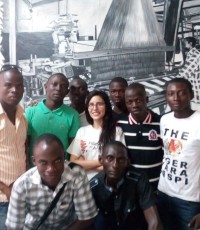
Melissa (center) training interns at Olam International.
When I started my Princeton In Africa Fellowship in September, I knew I would face new professional challenges and opportunities. But, before embarking on this journey I had no idea that my biggest challenge and opportunity, would have to do with using French as my main working language.
Prior to coming to Ivory Coast, I had spent three years working and studying in France and Belgium. During this time, my French language skills improved but during these years, my main working language was still English. Fast forward to my time in Abidjan, I am now in an office were French is the dominant language in professional and social settings. During my first few weeks, this change made me more timid and less likely to initiate conversation with my colleagues. This began to change as my time in Abidjan progressed and I became substantially more comfortable.
However, once I started to become more comfortable in using French as my main language, a real test to my language skills came up. As part of my job, I was to give a one-day training to 15 francophone Ivorian interns for an internal impact evaluation exercises. When I first received the message that I was to carry out this training, I got extremely nervous. I had never trained any group of people, and especially not in language that was not my own.
The day of the training arrived and I still did not feel fully prepared. Around 8 am that day all of the interns came into the room and it was time to start the training. At the beginning I spoke very fast, which I am sure made comprehension not so easy, but after a few minutes, I began to feel more comfortable with the group and after 8 hours, the interns had learned about Olam’s work and about the best way to carry-out an impact evaluation survey. By the time the day was over, a few people in the group complimented me on my high energy and positive demeanor. I have to say – it was not only one of the proudest moments of my fellowship, but of my professional and academic life. It’s been a couple of months since the training, and in part thanks to this experience, I feel way more comfortable in my post than I ever imagined.
Notes from the Field
By Johnna Sundberg, 2015-2016 Fellow with Spark MicroGrants in Rwanda
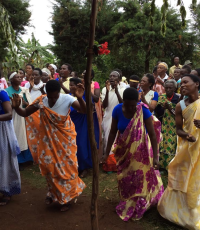
Ruhimbi communiy celebrating their graduation
At Spark MicroGrants, we believe our partners know what is best for their own communities. Spark provides seed funding, training, and management support to rural, East African communities so that they can implement a project of their choosing and reach their own goals. Spark’s facilitative model lasts three years. As a relatively new organization, the first communities are just beginning to “graduate” from the process.
Spark partnered with Ruhimbi community in 2012. Three years later, I attended their graduation ceremony. The three other Spark team members and I were greeted by dance and song, including traditional ululations, drums, and cow-horn flutes. Also in attendance were government leaders who came to show support and a journalist from a local radio channel. First, we heard from the community’s president who gave an update on the community’s progress to date.
Located in the extremely fertile, volcanic soils of Northern Rwanda, Ruhimbi community collectively decided a maize farming project would best help them achieve their goal of universal food security. From the profits of their farming project, the community has bought health insurance, mattresses and goats, as well as built latrines for all its 156 households. In addition, the profits expanded the project to include beans, and even provided capital for women to start a basket weaving cooperative. Additionally, the community has started their own village savings group. Successful harvests have also increased household income helping them achieve their original goal of food security. Next, the community plans to use their remaining microgrant balance to purchase cows to help mitigate the risk of climate change and poor harvests.
After giving short, congratulatory speeches and a toast of local banana beer, we bid farewell with baskets of beans and maize to bring back to the office. This is one story, but every time I go into the field I see amazing things happening in our communities. Spark is challenging the way our stakeholders—including the communities themselves—view international development, and my work with Spark has made me reconsider my own role within the sector.
Since I started my fellowship in September, I have been inspired to find how I can best support our staff and, by extension, Spark’s community partners. Some of my work involves analyzing historical data to measure Spark’s impact and provide evidence of what communities, like Ruhimbi, are achieving. Additionally, I have also been implementing systems and building dashboards to help the team access the information they need to do their jobs. Furthermore, Spark is continuously learning and improving on the model and I have been involved with helping track pilot programs and provide pilot teams support.
Although I have been with Spark almost a year, it took only one community visit for me to fully believe and support the model. Spark’s community-driven approach has challenged me to reconsider everything I thought I knew about development and by doing so has taught me where I can fit into the sector.
Notes from the Field
By Liz Wojnar, 2015-2016 Fellow with International Rescue Committee in Uganda
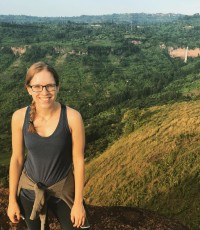
Liz in Kapchorwa near Sipi Falls Eastern Uganda
As Uganda anticipated its February elections and the American nomination process started heating up this year, politics were a popular source of conversation and connection: I asked colleagues to explain the headlines and they questioned me about the US’s clown car of candidates and sadly anticipated the departure of Obama, considered a fellow East African. Ugandan political news alternated from amusing to horrifying, to amusingly horrifying: headlines have included the “sacking” of the entire National Roads Authority for a fresh start against corruption; the mysterious death of the Internal Affairs Minister on an airplane; and everyday tabloid updates on who Members of Parliament were caught “bonking.”
Yoweri Museveni has been President since 1986 and most Ugandans have never known any other administration (48% are under age 15). The Parliament overturned the two term (10 year) presidential limit in 2001and since then the “Big Man” has held on to power – he is only the seventh-longest serving African leader. Most Ugandans acknowledged that change was highly unlikely– some cynically cited corruption, fraud and political repression; others defended his record of peace and campaign slogan of “steady progress” in development and were uninspired by alternatives with imperfect records. Some bluntly and pessimistically said that ultimately Ugandans weren’t political agitators: “We are cowards,” said one coworker. While opposition sentiment was strong in Kampala and other urbanized areas, the majority live in very rural areas with little access to news and Museveni’s rallies easily garner support with free promises, t-shirts and cash given to the local NRM official.
Uganda is a key military partner against al-Shabaab and recipient of American HIV/AIDS response funds. During the campaign, there was even a surreal Trump-Museveni exchange, in which Trump threated to imprison Robert Mugabe and Museveni, who responded “I have not heard about Mr. Trump, [he] has enough work to do… People are dying, being killed by guns. Maybe I could give him some advice on how to have peace in the USA.” They share a talent for colorful rhetoric, as Museveni threatened opposition supporters that “if you put your hands in the anus of a leopard, you are in trouble.” While I laughed and insisted that the GOP would never allow Trump to win, many Ugandans insisted Trump was the frontrunner – he was the only candidate they saw in the media. Their insights proved prescient. Just as in Uganda, name recognition (and brash self-confidence) is a powerful thing.
The Ugandan elections were tense: offices closed, people voted and then holed up at home. A few protests were dispersed by tear gas. The leading opposition candidate, Kizza Besigye, was meanwhile put under house arrest. The government blocked access to all social media for three days – to avoid the “spread [of] lies,” according to its representative. Some Ugandan women in my dance class supported the censorship, saying that people share fake stories and get hysterical – while they scrolled through their smartphone Facebook feed through a VPN network. Some Kampala voters waited seven hours for ballots – either due to the Electoral Commission’s incompetence or voter suppression in areas of strong Besigye support, depending on whom you ask. Since the elections, life has mostly returned to normal and people are resigned to the political inertia after the excitement and a reported $8 million in public elections funding (Uganda’s GDP per capita is only $575).
As I prepare to return home, I’m excited and nervous for our own elections which (unlike Uganda) will be closely followed by international observers. I hope the USA can surpass Uganda’s 60.5% voter turnout rate. While grateful for my freedom to type off a political rant status update and freely attend political rallies at home, I admire the Ugandans who tenaciously struggle for their right to vote and the few who refuse to accept the status quo.
Notes from the Field
By Mariah Wood, 2015-2016 Fellow with Clinton Health Access Initiative in South Africa
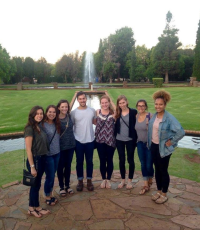
PiAfs gather in Johannesburg for our Southern Africa meet-up.
As an analyst working for the Clinton Health Access Initiative, my work this year has largely centered around inputting, organizing, and reorganizing data in Excel tools, and writing about what that data says in reports. While that’s been more interesting than it sounds, the most interesting part of this year has been engaging with the National Department of Health. At NDoH, one gets a glimpse into the initiatives and plans for the country’s health system.
South Africa has one of the largest private health sectors in the world as a percentage of total health spending. Less than 15% of the population has private insurance, but the private sector accounts for 46% of total healthcare spending. This speaks to the legacy of apartheid, during which the public primary health system, used primarily by non-white South Africans, was intentionally underfunded. It is in this context that the Department and country works toward the rollout of National Health Insurance, under the mandate that accessible, quality healthcare for all is required both morally and constitutionally. Yet, hearing officials and CHAI staff engage with some of the issues at hand – are healthcare delivery systems in place and ready to deal with the influx of new patients to the system, from what avenues will NHI funding come, on what timeframe will NHI be implemented, are there electronic health systems in place to track finance and disease burden data – has improved my understanding of how gargantuan an undertaking it is. It is one I find myself very interested in, both in this context and in the U.S. context.
Outside of work, the year has been a constant treadmill of new people and new environments. From road tripping across the country, to discussing world politics with people from various African, European, and North American countries, to incorporating new spices into my cooking (peri-peri for the win) and new sounds into my lexicon (“eish”, equivalent to “oh goodness”, now rolls off the tongue), I’m grateful for the newness and diversity that was this year. I’ve grown into someone with a more defined sense of her professional interests and a more nuanced perspective on how to operate in the world, and for that, I owe South Africa and the people I’ve met here one big, final thank you.
Notes from the Field
Supporter Profile: Frank Strasburger, Founder
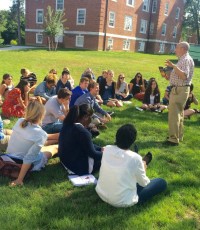
Frank (standing) speaking to the 2015-16 Fellows at Orientation
The Episcopal Chaplain at Princeton during the ’80’s and ’90’s, Frank Strasburger was co-founder of Princeton in Africa and president for our first five years. He and the other founders were ”frustrated at the profound ignorance of American leaders about the African Continent. We believed that if we could place future leaders for a year in positions where they could do work that mattered, they’d become committed for the rest of their lives, no matter what they did. And they’ve proved us right.” Still active as emeritus president, he participates in our orientations and has attended all but two retreats.





